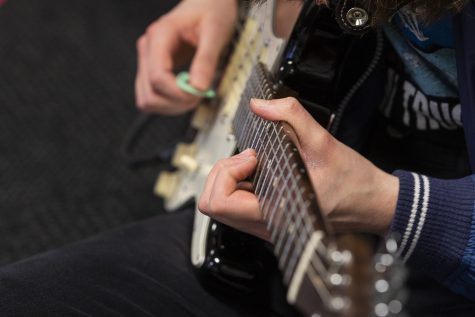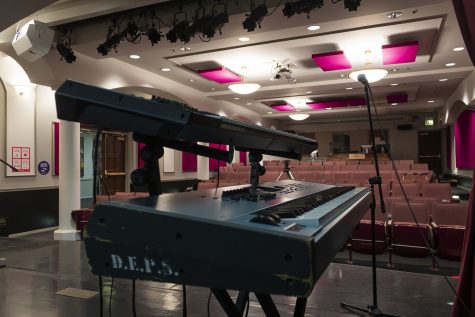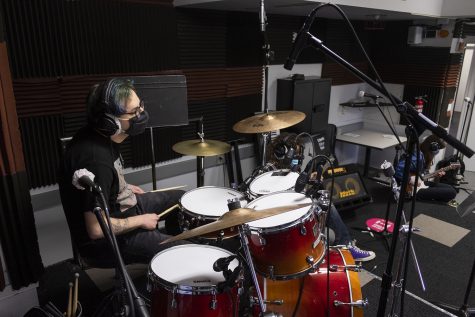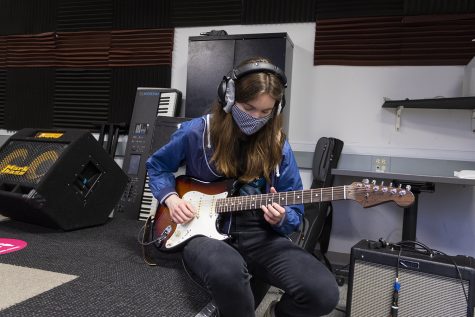Music Department finds new ways to stay in tune and play in sync
March 16, 2021

Remote classes and awkward interruptions over Zoom can tire anyone, but for some students, avoiding Zoom delays is crucial to their learning experience. These types of obstacles have encouraged the Music Department to enhance hybrid classes and take them to a new level.
Nick Tremulis, an adjunct faculty member in the Music Department teaching the hybrid “American Roots Ensemble,” is among the instructors whose students are using the Motu audio system to great effect.
Tremulis loves being back in-person with students and said teaching online just isn’t the same.
“Body language and how a person plays their instrument and how they carry the gait of their rhythm is very hard to recognize on a Zoom meeting,” Tremulis said. “When you’re all together, there’s a physicality to the way things work and … feel in the moment that’s incomparable. I love being there; it’s worth every minute of it.”
In September 2020, some students, faculty and staff in the 1014 S. Michigan Ave. building began using the Motu audio system, which is now in 14 rooms. The system allows rooms to “talk” to each other in real-time and without latency, according to Steve Hadley, the technical director of the Music Department.

In a March 9 email, Hadley said there are three faculty members teaching four ensembles that are using the new audio system.
The instrumental band is located in one room with masks, while vocalists are separated in personal rooms without masks and without risk of spreading COVID-19. The separate rooms act as recording studios that allow students to hear each other and play without lag.
The 14 rooms consist of 10 small rooms and four main rooms. Each student singer is allowed in one of the 10 rooms alone, while an instructor is located in one of the four main rooms to control the recording, along with students who play instruments.
While the system allows students to continue learning in-person while remaining socially distanced, the college already had plans to introduce the system before the pandemic for students to use for recording purposes.
Hadley said this allows students to make recordings without paying extra money.
“Let’s say you have a band, and you wanted to record your own band,” Hadley said. “Now you’ll be able to check out these rooms, and you could record and get a decent recording without having to pay for the studio time.”

Paige Kizer, a junior music major and Tremulis’ student, has been a member of the American Roots Ensemble for two semesters.
Kizer is a vocalist and participates in a separate room from the instrumental performers. Last semester the course was completely online, and Kizer said she is happy to be back in-person but misses being in the same room with other students.
“One of the hardest parts about it is not being able to bounce off ideas with the other vocalists,” Kizer said. “When I was in an ensemble last year, there were four singers and we’d have to figure out the harmonies or the backup parts. We’d be standing next to each other, sometimes singing into each other’s ear to try and get the parts down or figure out what would work, and that is really hard to do when you’re separated by walls and doors.”
During the Fall 2020 semester, the American Roots Ensemble had a different instructor and focused more on the recording because it was completely online, Kizer said.
“The online format looked at the ensemble as more of making a record,” Kizer said. “We were doing two recordings every week, and it was heavy with the technology that we had to be using.”
Kizer said using the Motu system, she stands alone in a practice room and is only able to see her classmates through Zoom on her iPad.

“The technology is very cool,” Kizer said. “It’s kind of crazy that we can sing in a different room, and the band is in another room, and it’s all happening at the same time.”
The American Roots Ensemble started using the Motu audio system just two weeks ago, and it has worked well, with the engineering team able to help instructors navigate the system.
“Steve Hadley has such a great crew; they’re really fast,” Tremulis said. “It’s been amazingly effortless. Within 15 minutes we can all hear each other, and we just start working.”
Tremulis said because the rooms double as recording studios, using them is “natural” for musicians.
“The (Motu system) works fine; it’s almost exactly like being in a recording studio where some people are in booths because they need isolation for their sound, and there’s no difference,” Tremulis said. “That’s the advantage of being a musician, you do your best work with your eyes closed. It’s really like being in a live recording session, which is great.”







